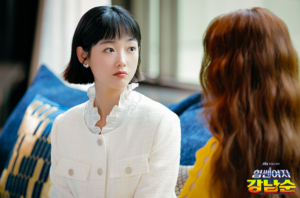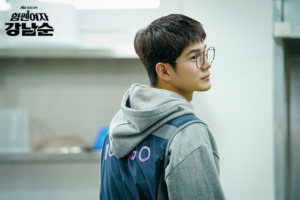
Strong Girl Nam-soon arrived six and a half years after the conclusion of its predecessor, Strong Woman Do Bong-soon. A lot has changed in those years, and though both seasons are both written by Baek Mi-kyung, romance is less of a focus in SGNS. Instead, it is packed to the brim with social commentary that does not always land.
This review contains spoilers.
SGNS continues the world-building from the first season. Like Bong-soon (Park Bo-young) from the first season, Gang Nam-soon (Lee Yoo-mi), comes from a long line of women with superhuman strength. However, unlike Bong-soon, Nam-soon also has extraordinary hearing capabilities and sight, which suggests that superhuman strength is not the only power that runs in the family.
As Nam-soon is accidentally separated from her family and grows up in Mongolia, she does not start learning about her family legacy until she is reunited with her family as an adult in Korea. She comes back to Korea to learn that she is the long-lost daughter of a very affluent family; her full name, Gang Nam-soon, is no doubt a reference to the Seoul district associated with wealth and luxury. Nam-soon also realizes that her maternal grandmother, Gil Joong-gan (Kim Hae-sook), and mother, Hwang Geum-joo (Kim Jung-eun), have the same superpowers that she does.
Joong-gan, Geum-joo, and Nam-soon are all very strong, capable, and confident women, and through their characters SGNS tries to demonstrate the positive effect that empowered women have. From the very beginning of SGNS, all three are comfortable with their strength, and they are not afraid to wield their powers as they see it. With their physical powers and family wealth, the three women are committed to using their various resources to help make the world a better place. Their biggest mission of the drama is to take down Ryu Si-o (Byeon Woo-seok), a big-time drug dealer intent on taking over Korea with his drug empire.

Since SGNS is focused heavily on its female characters, romance does take a back seat. While Nam-soon does have a love interest, police officer Gang Hee-sik (Ong Seong-wu), the drama tends to highlight other types of relationships, especially between women.
Indeed, while Joong-gan, Geum-joo, and Nam-soon care for one another and frequently come to each other’s rescue, the three also look out for other women. Geum-joo has a friendly relationship with her secretary, Jung Na-young (Oh Jeong-yeon). When Na-young is blackmailed by Si-o and ordered to betray Geum-joo, she does not. Instead, she is honest with Geum-joo about what happened, and Geum-joo finds a way to save her. Na-young’s refusal to betray Geum-joo is suggested to be a result of working for such a supportive and compassionate boss. However, Joong-gan, Geum-joo, and Nam-soon’s kindness extends beyond those who have always been on their side. Before the real one comes along, Ri Hwa-ja (Choi Hee-jin) tricks Nam-soon’s family into thinking that she is their real long-lost Nam-soon. Once the truth emerges, she attempts to murder Nam-soon. However, none of that is enough to stop Nam-soon and her family from forgiving her, and in the end their forgiveness is repaid by Hwa-ja’s loyalty to them.
While many of the women in the drama are shown as strong, capable, and determined, they are portrayed as such at the expense of the men. The running joke throughout the drama is that the women in the family are strong and the men are weak. Geum-joo’s brother, Hwang Geum-dong (Kim Ki-doo), is frail and whiny, and he constantly requires the support of either his mother or sister. Nam-in (Han Sang-jo), Nam-soon’s brother, has one personality trait: he loves to eat. By characterizing the men in Nam-soon’s family in such ways, SGNS signals that the empowerment of women comes at the expense of men. The portrayal of women in the drama evidently suggests that there are feminist messages at heart, but it also contains missteps by implying that powerful women result in weak men.

This message is not the only misstep the drama features in its attempt to address social values. In the drama, Joong-gan loudly professes that romantic love is not limited to the young, as her family members initially oppose her relationship with Seu Jun-hee (Jung Bo-suk), an elderly barista employed at Nam-in’s cafe. Unlike the sincerity of Nam-soon’s scenes with Hee-sik, Joong-gan and Jun-hee’s chemistry is often more comedic than romantic. Using the couple for laughs seems as if SGNS itself is not taking Joong-gan’s point seriously.
Despite the drama’s mixed-messaging, it does make for a good watch if you want to escape reality and its more murky and nuanced differences between good and bad. Indeed, in SGNS, Nam-soon and her allies are endlessly kind and forgiving, while the villain is as evil as they come. Having such parties in conflict means that there is never any doubt that Nam-soon and her family will emerge from whatever challenges they face, unscathed and victorious. Indeed, though Joong-gan, Geum-joo, and Nam-soon face various threats and opposition throughout their quests for romance and justice, theses threats never actually feel serious. As a result, the drama tends to lack any palpable suspense.
To no one’s surprise, happy endings are galore for Nam-soon and her family in their romantic, personal, and professional lives. Overall, SGNS is a great watch if you are in the mood for an upbeat drama where the good guys will never let you down. With a further nod to other strong relatives that Nam-soon and Bong-soon have, perhaps more strong women will be headed our way soon.
(Korea Joongang Daily, YouTube. Images via JTBC and Netflix.)


